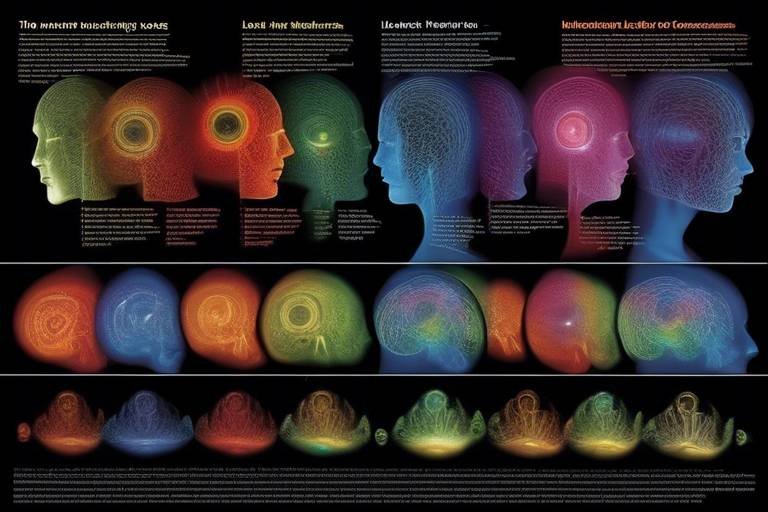Mind Reading - Is it Plausible?
The concept of mind reading has long captivated the human imagination, provoking a mixture of awe and skepticism. From ancient folklore to modern science fiction, the idea that one could delve into another's thoughts sparks both curiosity and fear. But is it really plausible? Can we, as a species, unlock the secrets of each other's minds, or are we merely chasing a fantasy? In this article, we will explore the scientific foundations, cultural representations, and ethical implications surrounding mind reading, ultimately questioning its feasibility in our reality.
To understand the plausibility of mind reading, we must first look at the neurological and psychological theories that underpin this fascinating concept. Recent advancements in neuroscience have illuminated how brain activity patterns can be interpreted. For instance, researchers utilize functional magnetic resonance imaging (fMRI) to observe brain activity in real-time, revealing how different thoughts and emotions correspond to specific neural patterns. Imagine being able to decode these patterns; it would be akin to having a universal translator for thoughts!
Moreover, the notion of telepathy—the ability to communicate thoughts without verbal cues—has been a subject of both scientific inquiry and popular speculation. While traditional science remains skeptical, some studies suggest that humans might possess latent abilities for non-verbal communication that could be harnessed under certain conditions. This leads us to ponder: could there be a hidden layer of human interaction that we have yet to fully understand?
Mind reading has found a prominent place in various forms of media and literature, shaping public perception and fueling curiosity about its potential. From the enigmatic characters in classic novels to the telepathic heroes in blockbuster films, mind reading serves as a powerful narrative device that reflects our deepest desires and fears about human connection.
When we analyze the differences between fictional portrayals of mind reading and the scientific understanding of cognition, we uncover a rich tapestry of human imagination. In fiction, mind readers often possess extraordinary abilities, allowing them to navigate complex social situations with ease. In contrast, the reality of human cognition is far more intricate and nuanced. The impact of creative storytelling on societal beliefs cannot be understated; it often blurs the lines between what is possible and what is merely a figment of our imagination.
Movies and TV shows have played a significant role in popularizing the concept of telepathy. Characters like Professor X from the X-Men series or the Mind Flayer from Stranger Things have shaped audience expectations, often presenting telepathy as a superpower rather than a scientifically grounded phenomenon. This portrayal can lead to misconceptions about the actual capabilities of human communication and the potential for genuine connection.
Classic and contemporary literature is rife with examples of mind reading, each narrative reflecting societal hopes and fears regarding human connection. From Shakespeare's Hamlet to modern works like The Perks of Being a Wallflower, these stories often explore themes of isolation, misunderstanding, and the desire for deeper connections. They challenge us to consider whether true understanding is ever attainable or if we are forever locked in our own thoughts.
Numerous studies have attempted to measure or simulate mind reading, often yielding intriguing results. For example, a notable experiment conducted by neuroscientists involved participants attempting to communicate specific thoughts to one another using brain-computer interfaces. The methodologies employed in these studies vary widely, from simple binary choices to more complex tasks requiring nuanced understanding. The implications of these findings are profound, suggesting that while we may not be able to read minds in the traditional sense, we are inching closer to understanding the intricate dance of human thought.
As we delve deeper into the realm of mind reading, we must also confront the ethical dilemmas that accompany such abilities. The potential for misuse raises serious questions about privacy, consent, and the moral responsibilities of those who might possess such powers. Imagine a world where thoughts are no longer private; how would that change our interactions and relationships?
One of the most pressing issues surrounding mind reading is the potential invasion of personal privacy. If thoughts could be accessed without consent, the very fabric of our societal norms would be challenged. Individuals may feel stripped of their autonomy, leading to a world where personal boundaries are continually violated. The question arises: What rights do we have over our own mental processes?
Furthermore, the ethical challenges surrounding consent in mind reading scenarios cannot be overlooked. The potential for abuses of power is significant, especially in contexts where individuals might be coerced into revealing their thoughts. The societal impact of such capabilities could be profound, leading to mistrust and fear among individuals. As we navigate these complex waters, we must carefully consider the implications of mind reading on our collective morality.
- Is mind reading scientifically possible? While there are advancements in understanding brain activity, true mind reading as portrayed in fiction remains unproven.
- What are the ethical concerns regarding mind reading? Privacy, consent, and potential misuse are significant ethical dilemmas that need to be addressed.
- How has mind reading been portrayed in popular culture? Mind reading is often depicted as a superpower in films and literature, influencing public perception.
- Can telepathy exist in human interactions? Some studies suggest latent abilities for non-verbal communication, but more research is needed.

The Science Behind Mind Reading
The concept of mind reading has long fascinated humanity, intertwining itself with our understanding of consciousness and communication. At its core, mind reading—or the ability to perceive another person's thoughts—challenges our grasp of human cognition and the workings of the brain. Recent advancements in neuroscience and psychology have begun to unravel some of the mysteries surrounding this intriguing phenomenon. Could it be that we are more connected than we realize, with subtle signals and brain activity patterns acting as a form of unspoken communication?
Neuroscientific research has shown that our brains are constantly at work, processing a myriad of signals and stimuli. The idea of mind reading is often linked to the concept of telepathy, a term that evokes images of mystical abilities seen in movies and books. However, the scientific community approaches this concept with a more grounded perspective. Studies suggest that while true telepathy remains in the realm of fiction, there are indeed ways in which we can "read" others' thoughts or feelings through non-verbal cues and brain activity.
One fascinating area of study is the examination of brain activity patterns. Researchers have utilized techniques such as functional magnetic resonance imaging (fMRI) to observe how different parts of the brain activate during social interactions. For instance, when we engage in conversation, our brains may subconsciously pick up on micro-expressions, tone of voice, and even body language, which can convey emotions and intentions without a single word being spoken. This phenomenon raises the question: are we already practicing a form of mind reading without realizing it?
Furthermore, some studies have attempted to decode brain signals to predict what a person might be thinking. In one experiment, participants were shown various images while their brain activity was monitored. The researchers then used machine learning algorithms to analyze the data, successfully predicting the images that participants were viewing based solely on their brain activity. While this does not equate to traditional mind reading, it does hint at the potential for technology to bridge the gap between our thoughts and external expression.
It’s essential to recognize that while the scientific exploration of mind reading is captivating, it also raises complex questions about the nature of thought and communication. Can we truly separate our thoughts from the influences of our environment? Are we capable of sharing our innermost feelings without the aid of language? The answers to these questions remain elusive, but the ongoing research in this field continues to inspire curiosity and debate.
As we delve deeper into the neuroscience of mind reading, we must also consider the implications of these findings. If we can indeed interpret thoughts and feelings through brain activity, what does that mean for our understanding of privacy and personal boundaries? The line between understanding and invasion becomes increasingly blurred, prompting us to reflect on the ethical dimensions of such capabilities.
In conclusion, the science behind mind reading is a rich tapestry of neurological research and psychological theory. While the traditional notion of mind reading may not be scientifically feasible, the underlying mechanisms that allow us to connect with one another on a deeper level are very much real. As we continue to explore the complexities of human thought and interaction, we may find ourselves on the brink of a new understanding of what it means to truly communicate.

Cultural Representations of Mind Reading
Mind reading has long captivated the human imagination, manifesting in various forms across cultures and epochs. From ancient folklore to modern cinema, the idea of perceiving another's thoughts without verbal communication has been a source of fascination. This cultural representation serves not only as entertainment but also as a reflection of our deepest desires for connection and understanding. Have you ever wished you could truly know what someone else is thinking? This desire is a powerful force that drives the narratives we create around mind reading.
In literature, mind reading often symbolizes the ultimate form of intimacy and connection. Characters endowed with this ability are frequently portrayed as heroes or saviors, capable of bridging emotional gaps between individuals. For example, in many romance novels, the protagonists can intuitively understand each other's feelings, showcasing a heightened level of empathy that the average person may struggle to achieve. This portrayal enhances the narrative, allowing readers to escape into a world where misunderstandings are resolved effortlessly.
Similarly, film and television have taken the concept of mind reading to new heights. Movies like “The Matrix” and shows like “Stranger Things” explore telepathy and psychic abilities, creating thrilling scenarios that challenge the boundaries of reality. These representations often blur the lines between fiction and reality, leading audiences to question whether such abilities could ever exist in the real world. The visual impact of these stories, combined with their engaging plots, leaves a lasting impression on viewers, making them more receptive to the idea of mind reading.
However, it’s crucial to distinguish between fiction and reality. While stories of mind reading can be thrilling, they often exaggerate the capabilities of human cognition. In reality, our understanding of the brain is still evolving. The scientific community continues to explore how thoughts and emotions are processed, and while some studies suggest patterns of brain activity can be interpreted, the leap to actual mind reading remains significant.
Moreover, the cultural fascination with mind reading often reflects societal hopes and fears. On one hand, the idea of understanding others' thoughts can be seen as a means to foster deeper connections and empathy. On the other hand, it raises questions about privacy and autonomy. As we consume these narratives, we must consider the implications of such powers in our own lives. Would you want someone to know your innermost thoughts? This duality is what makes the topic of mind reading so compelling and complex.
To illustrate the impact of mind reading in cultural narratives, we can look at a few notable examples:
| Medium | Title | Key Themes |
|---|---|---|
| Film | The Matrix | Reality vs. Perception |
| TV Show | Stranger Things | Friendship and Loyalty |
| Literature | Harry Potter Series | Connection and Understanding |
As we navigate through different cultures and their representations of mind reading, it becomes evident that this concept is not merely a fantastical idea but a reflection of our intrinsic human nature. The desire to connect, to understand, and to communicate without barriers is universal. While we may not have the ability to read minds, the stories we tell about it continue to shape our perceptions and aspirations regarding human interaction.

Fiction vs. Reality
When we think about mind reading, our minds often drift to the fantastical realms of fiction, where characters effortlessly pluck thoughts from one another's minds like ripe fruit from a tree. Movies, books, and TV shows paint a vivid picture of telepathy, making it seem not just possible, but commonplace. But what happens when we step back from these imaginative worlds and look at the reality of human cognition? The contrast is striking, and it raises some intriguing questions.
In fiction, mind reading is often depicted as a superpower—characters can instantly know what others are thinking, leading to dramatic plot twists and heightened emotional stakes. For instance, in the popular series “X-Men,” the character Professor X possesses the ability to read minds, which he uses for both good and bad. This portrayal ignites our imagination and makes us wonder: what if we could truly connect with others on such a profound level? Would it eliminate misunderstandings, or would it create chaos as people grapple with the raw honesty of each other's thoughts?
However, in the realm of science, the picture is much more nuanced. While researchers have made strides in understanding brain activity through technologies like fMRI (functional Magnetic Resonance Imaging) and EEG (Electroencephalography), the ability to read someone's thoughts with pinpoint accuracy remains firmly in the realm of science fiction. Current scientific endeavors focus on interpreting brain signals and patterns, but translating those signals into coherent thoughts is an entirely different challenge. For instance, a study might show that a person is experiencing fear or happiness based on brain activity, but it can't reveal the specific thoughts that prompted those feelings.
Moreover, the idea of mind reading in fiction often overlooks the complexities of human emotion and cognition. In reality, our thoughts are influenced by a myriad of factors—our experiences, emotions, and even cultural background. This complexity makes it nearly impossible to accurately interpret another person's thoughts without context. Imagine trying to decipher an intricate painting without knowing the artist's intent; it’s a similar challenge when it comes to understanding someone else's mind.
To illustrate this further, let’s consider a simple comparison table that highlights the differences between fictional and real-life mind reading:
| Aspect | Fictional Mind Reading | Real-Life Mind Reading |
|---|---|---|
| Accuracy | Near-perfect | Highly variable |
| Emotional Context | Often ignored | Crucial for understanding |
| Consequences | Heroic or villainous | Ethical dilemmas |
| Technology | Magical or superhuman | Scientific and experimental |
As we can see, the gap between fiction and reality is not just a matter of imagination; it's grounded in the very nature of human thought and interaction. While fictional narratives can inspire us and spark our curiosity about the potential of human connection, they also set up unrealistic expectations about what mind reading could entail. The emotional and ethical complexities of such abilities are often glossed over in favor of dramatic storytelling.
So, the next time you find yourself captivated by a story involving telepathy, take a moment to reflect on the underlying realities of human cognition. While the idea of reading minds is thrilling and tantalizing, it serves as a reminder of the rich tapestry of human experience that makes our interactions so unique and valuable. It’s not just about knowing what someone is thinking; it’s about understanding them—something that requires empathy, communication, and a whole lot of heart.
- Can mind reading be scientifically proven? Currently, there is no scientific method to accurately read minds as portrayed in fiction. Research focuses on understanding brain activity but does not allow for precise thought interpretation.
- Are there any real-life applications of mind reading technology? Technologies like fMRI and EEG can help in medical diagnoses and understanding brain disorders, but they do not enable mind reading in the way we see in movies.
- What ethical concerns surround the idea of mind reading? Issues of privacy, consent, and potential misuse of such abilities are significant ethical concerns that need to be addressed.

Telepathy in Popular Media
When we think about telepathy, our minds often drift to the captivating worlds depicted in movies, television shows, and books. These forms of media have played a significant role in shaping our understanding and expectations of mind-reading abilities. From the mind-bending narratives of science fiction to the eerie suspense of horror films, telepathy is portrayed in various ways that both intrigue and entertain us.
Take, for instance, the iconic movie Inception, where characters delve into dreams to share thoughts and ideas. Here, the concept of telepathy is intertwined with the complexities of the subconscious, challenging our perception of reality and communication. This film, like many others, presents telepathy as a tool for connection, often blurring the lines between what is possible and what is purely imaginative.
Moreover, television shows like Stranger Things have popularized the idea of telepathy through characters who possess extraordinary mental abilities. Eleven, the show's central character, showcases how telepathy can be both a gift and a burden, highlighting the emotional weight that comes with such power. These portrayals evoke a sense of wonder but also caution, as they often illustrate the potential for misuse and the consequences of invading others' thoughts.
In literature, telepathy has been a recurring theme, from classic works like 1984 by George Orwell to contemporary novels such as The Power by Naomi Alderman. These narratives explore the implications of mind reading in society, raising questions about control, freedom, and the nature of human connection. In these stories, telepathy serves as a metaphor for deeper societal issues, reflecting our fears and aspirations about understanding one another.
It's fascinating to consider how these fictional depictions influence public perception. They often create a sense of expectation regarding the capabilities of human communication. People may start to believe that telepathy is just around the corner, or they may develop misconceptions about its nature and limits. The portrayal of telepathy in popular media can lead to a double-edged sword effect, where the allure of mind-reading abilities captivates audiences while simultaneously distorting their understanding of real human interactions.
To further illustrate the impact of telepathy in popular media, let’s look at a quick comparison of notable examples:
| Media | Example of Telepathy | Impact on Audience |
|---|---|---|
| Movies | Inception | Challenges perceptions of reality and communication |
| TV Shows | Stranger Things | Explores the emotional burden of telepathy |
| Literature | 1984 | Reflects societal fears about control and understanding |
As we consume these stories, it’s essential to remember that while telepathy can be a thrilling concept, it remains firmly in the realm of fiction. The creative storytelling found in popular media sparks our imagination and invites us to ponder the possibilities of human connection. Yet, it also serves as a reminder of the complexities of our minds and the ethical dilemmas that could arise if such abilities were ever to become a reality.

Mind Reading in Literature
Mind reading has long captivated the imagination of writers and readers alike, serving as a powerful metaphor for the profound desire to connect with others on a deeper level. In literature, the concept of telepathy often transcends mere fantasy, reflecting our innate curiosity about the human psyche and the complexities of interpersonal relationships. From the early works of science fiction to modern psychological thrillers, mind reading serves as a narrative device that explores the boundaries of communication, empathy, and understanding.
One of the most notable examples can be found in the works of Philip K. Dick, whose novels frequently delve into the implications of altered states of consciousness and the potential for mind-to-mind communication. In his story “Ubik,” characters navigate a world where psychic abilities are not just possible but are intricately woven into the fabric of reality. This reflection of societal hopes and fears regarding human connection invites readers to ponder: What if we could truly understand one another's thoughts?
Similarly, in Stephen King's “The Shining,” the protagonist Danny possesses a psychic ability known as "the shining," allowing him to perceive the thoughts and emotions of others. This ability not only creates tension within the narrative but also serves as a poignant reminder of the burden that comes with profound empathy. In this way, literature often portrays mind reading as a double-edged sword—while it can foster intimacy, it can also lead to isolation and despair.
Moreover, the portrayal of mind reading in literature often raises questions about identity and self-awareness. In works like “The Mind Readers” by Michelle A. Valentine, characters grapple with their abilities, seeking to understand their place in a world where thoughts are no longer private. This exploration of the self in relation to others highlights the delicate balance between connection and autonomy, prompting readers to consider how much of our inner lives we wish to share.
In addition to fiction, mind reading also appears in classic literature, such as in Jane Austen's “Pride and Prejudice,” where characters often seem to possess an uncanny ability to read each other's emotions and intentions. While not explicitly labeled as mind reading, this intuitive understanding serves to drive the plot and deepen character relationships, illustrating how literature can mirror the complexities of human interaction.
As we explore these narratives, it's essential to recognize that mind reading in literature is not merely a fantastical element but a reflection of our collective desire for connection and understanding. It challenges us to confront our own limitations in communication and empathy, raising the question: What would it mean for our relationships if we could truly know what others are thinking?
In conclusion, literature serves as a rich tapestry for examining the concept of mind reading, allowing us to explore the intricacies of human connection while grappling with the ethical and emotional implications of such abilities. Through the lens of fiction, we can reflect on our own experiences and relationships, ultimately leading us to a deeper understanding of ourselves and those around us.
- What is mind reading? Mind reading refers to the ability to perceive or interpret the thoughts and feelings of others, often depicted in literature and media as a form of telepathy.
- Is mind reading scientifically possible? While there are studies exploring brain activity and communication, true mind reading as commonly portrayed in fiction has not been proven scientifically.
- How is mind reading depicted in literature? Mind reading in literature often serves as a metaphor for deep emotional connection and understanding, reflecting societal hopes and fears about interpersonal relationships.
- What are the ethical implications of mind reading? The potential for privacy invasion, consent issues, and the misuse of mind reading abilities raises significant ethical concerns.

Scientific Experiments and Findings
The quest to understand and potentially harness the power of mind reading has led to a plethora of scientific experiments and findings. Researchers have delved into the intricate workings of the human brain, seeking to uncover whether it’s possible to decipher thoughts or intentions through observable brain activity. One of the most notable studies in this realm was conducted by a team at the University of California, Berkeley, where scientists utilized functional magnetic resonance imaging (fMRI) to monitor brain patterns while participants viewed images. The results were astounding; the researchers were able to predict, with a degree of accuracy, the specific images that individuals were looking at based solely on their brain activity patterns.
Another significant experiment was carried out by neuroscientists at the University of Washington, who explored the possibility of telepathy through brain-to-brain communication. In this study, pairs of individuals were connected via EEG (electroencephalography) systems, allowing researchers to transmit information from one brain to another. The findings suggested that it might be possible to convey simple information, such as the direction of movement, between brains, albeit with considerable limitations. This raises fascinating questions about the potential for more complex forms of communication in the future.
However, despite these promising results, the concept of mind reading remains largely theoretical. The scientific community is still grappling with several challenges:
- Complexity of Human Thought: Human thoughts are not only complex but also deeply personal. The challenge lies in translating these intricate mental processes into quantifiable data.
- Ethical Considerations: The implications of potentially being able to read minds raise significant ethical questions about privacy and consent.
- Technological Limitations: Current technology, while advanced, is still in its infancy when it comes to accurately interpreting thoughts across diverse contexts.
Moreover, a study published in the journal Nature Neuroscience highlighted the potential for using machine learning algorithms to decode brain signals. By training these algorithms on brain activity data, researchers were able to reconstruct images that participants were viewing with surprising accuracy. This study not only showcases the advancements in technology but also hints at the possibility of interpreting thoughts in the near future. Yet, it is essential to note that these reconstructions were limited to visual stimuli and did not extend to more abstract thoughts or emotions.
In summary, while the scientific experiments and findings related to mind reading are both intriguing and groundbreaking, they underscore the complexity of human cognition. The journey towards understanding and possibly achieving mind reading capabilities is fraught with challenges that require further exploration. As we continue to push the boundaries of neuroscience, who knows what the future might hold? Perhaps one day, the ability to understand each other's thoughts will no longer be the stuff of science fiction but a reality, albeit with necessary ethical safeguards in place.
Q1: Is mind reading scientifically possible?
A1: While there have been experiments suggesting the possibility of interpreting certain brain signals, true mind reading as depicted in fiction remains largely theoretical.
Q2: What are the ethical concerns surrounding mind reading?
A2: Ethical concerns include privacy issues, consent, and the potential misuse of such abilities, which could lead to significant societal implications.
Q3: How do scientists study mind reading?
A3: Scientists use various methods, including fMRI and EEG, to monitor brain activity and attempt to decode thoughts or intentions based on observed patterns.
Q4: Can mind reading be used for communication?
A4: Preliminary studies suggest that simple information can be conveyed between brains, but this is still in the experimental stages and has many limitations.

The Ethical Implications of Mind Reading
As we dive into the fascinating world of mind reading, we can't help but stumble upon a maze of ethical dilemmas that arise from the very notion of being able to access another person's thoughts. Imagine a world where your innermost secrets and feelings are laid bare for anyone with this extraordinary ability to see. It raises a plethora of questions about privacy, consent, and the potential for misuse. Could this ability be a blessing or a curse? Let's explore these ethical implications and the moral responsibilities that come with such power.
First off, let's talk about privacy concerns. In a society where privacy is already a hot topic, the idea of mind reading could push the boundaries of personal space into uncharted territory. If someone could read your thoughts without your permission, where would that leave your right to keep certain things private? It's akin to having an open book where every page reveals your deepest fears and desires, leaving you vulnerable and exposed. The very essence of what it means to be human—our ability to think and feel privately—could be compromised. Would you want someone to know your thoughts on a bad hair day, or your secret crush on a colleague? The implications are staggering.
Next, we must consider the issue of consent. In any interaction, consent is paramount, and the same should apply to mind reading. If one individual possesses the ability to read another's thoughts, does that person have the right to do so without explicit permission? Imagine a scenario where someone could tap into your mind during a negotiation or a legal proceeding. This could lead to a significant power imbalance, where one party has access to the unfiltered thoughts of the other, potentially skewing outcomes in their favor. The ethical challenges surrounding consent in mind reading scenarios are complex and layered, raising questions about the very nature of trust in human relationships.
Moreover, the potential for misuse of mind reading abilities cannot be ignored. Just as any powerful tool can be wielded for good or evil, mind reading could easily fall into the wrong hands. Think about it: what if a government or corporation developed technology that allowed them to read the thoughts of individuals? This could lead to a dystopian reality where personal freedoms are stripped away, and individuals are constantly surveilled. The societal impact of such capabilities would be profound, potentially leading to a culture of fear and mistrust. The ethical ramifications of mind reading extend far beyond individual privacy, touching upon the very fabric of our society.
In conclusion, while the idea of mind reading is tantalizing and offers a glimpse into enhanced human connection, we must tread carefully. The ethical implications are vast and complex, requiring us to reflect on our values and the kind of society we want to cultivate. As we ponder the plausibility of mind reading, let’s also consider the moral responsibilities that come with such an extraordinary ability. After all, with great power comes great responsibility, and the ability to read minds may just be the ultimate test of our humanity.
- Can mind reading be scientifically proven? While there are studies exploring brain activity and communication, true mind reading remains a concept largely in the realm of science fiction.
- What are the potential benefits of mind reading? If mind reading were possible, it could enhance communication and empathy, allowing for deeper understanding between individuals.
- How could society regulate mind reading abilities? Establishing strict ethical guidelines and legal frameworks would be essential to protect individual rights and privacy.
- Are there any fictional examples that explore these themes? Yes, many books and films, such as "The Giver" and "Inception," delve into the implications of mind reading and its effects on society.

Privacy Concerns
Imagine walking down the street, and suddenly, someone can hear your thoughts. Sounds like a scene straight out of a sci-fi movie, right? But as we explore the implications of mind reading, we must confront the unsettling reality of . The very essence of our thoughts—our hopes, fears, and secrets—could be laid bare for others to see. This possibility raises profound questions about the boundaries of personal privacy and the rights individuals have over their own mental processes.
In a world where mind reading is a reality, the concept of privacy would undergo a radical transformation. The sanctity of our inner thoughts could be compromised, leading to a society where no one is truly safe from scrutiny. This potential invasion of privacy can be likened to having a window into your soul, where every fleeting idea and emotion is exposed to the world. The implications are staggering. How would we maintain our sense of self if our most intimate thoughts were accessible to others? Would we still feel comfortable expressing our true feelings in conversations, knowing they could be interpreted without our consent?
Furthermore, the ethical dilemmas surrounding consent in mind reading scenarios become increasingly complex. If someone possesses the ability to read minds, do they have the right to access another person's thoughts without permission? This situation could lead to a slippery slope of manipulation and control, where individuals could exploit their abilities for personal gain. Consider a workplace scenario where a manager can read the thoughts of their employees. Such a power imbalance could severely undermine trust, creating a toxic environment where employees feel constantly vulnerable and exposed.
To illustrate the potential ramifications, let’s consider a few key points:
- Loss of Autonomy: If mind reading becomes commonplace, individuals may lose the autonomy to control what thoughts are shared and with whom.
- Social Stigmas: Those who are unable to conceal their thoughts may face social stigmas, leading to discrimination based on perceived mental states.
- Legal Implications: The legal system would need to evolve to address the complexities of thought privacy, potentially creating new laws to protect individuals from mental intrusions.
Ultimately, the prospect of mind reading forces us to reevaluate our understanding of privacy. In a society where thoughts could be an open book, the very fabric of interpersonal relationships would be tested. Would we still cherish our friendships and connections, or would they become transactional, based on the ability to read and manipulate thoughts? As we dive deeper into the realm of mind reading, it’s crucial to consider not just the scientific possibilities but also the ethical and moral frameworks that govern our understanding of privacy.
- What are the main privacy concerns related to mind reading? The primary concerns include the loss of personal autonomy, potential for abuse of power, and the need for legal protections against mental intrusions.
- How could mind reading affect interpersonal relationships? Mind reading could fundamentally alter how we communicate, potentially leading to mistrust and a lack of genuine connection.
- What measures could be taken to protect privacy if mind reading were possible? Legal frameworks would need to be established to safeguard mental privacy and ensure consent before accessing someone's thoughts.

Consent and Misuse
When we delve into the realm of mind reading, one of the most pressing issues that arises is the concept of consent. Imagine a world where someone could tap into your thoughts without your permission. It sounds like a plot straight out of a science fiction novel, but the potential for such a reality raises serious ethical dilemmas. The idea of mind reading challenges our traditional understanding of privacy and autonomy. After all, our thoughts are intrinsically personal, and the notion of someone else accessing them without our explicit agreement feels like a massive invasion.
Let’s break it down: in situations where mind reading could be possible, consent becomes a slippery slope. Would individuals be required to give consent each time a thought is accessed? Or would it be more akin to a blanket agreement, similar to how we often consent to data usage online? The implications of such a system could lead to profound societal changes. For instance, in a workplace where mind reading is normalized, could an employer access their employees' thoughts to gauge their satisfaction or productivity? This scenario raises uncomfortable questions about power dynamics and the potential for exploitation.
Moreover, the potential for misuse in mind reading scenarios is staggering. If mind reading were to become a reality, it could be weaponized in various ways. Here are a few scenarios that illustrate this point:
- Manipulation: Imagine a scenario where someone uses their ability to read minds to manipulate decisions or actions of others. This could occur in personal relationships, business negotiations, or even political arenas.
- Coercion: The ability to know someone’s thoughts could lead to coercive behavior, where individuals feel pressured to act in certain ways because their thoughts are being monitored.
- Surveillance: Governments or organizations might use mind reading as a tool for surveillance, infringing on personal freedoms and creating a culture of fear.
The ethical implications extend beyond just the individual. Societal norms and values would need to adapt to accommodate this new reality. Would we need new laws to protect individuals from unauthorized access to their thoughts? How would we ensure that consent is informed and not coerced? These are questions that society would have to grapple with in the event that mind reading became a feasible capability.
In summary, while the concept of mind reading is fascinating and could open doors to deeper understanding and connection among individuals, the potential for misuse cannot be ignored. The ethical landscape surrounding consent is complex and requires careful consideration to prevent exploitation and ensure that human rights are preserved. As we explore the possibilities of mind reading, we must remain vigilant about the moral implications and strive to create a framework that prioritizes consent and protects individuals from potential abuses.
- What is mind reading? Mind reading refers to the hypothetical ability to perceive the thoughts or feelings of another person without them expressing it verbally.
- Is mind reading scientifically possible? Currently, there is no scientific evidence to support the existence of mind reading as portrayed in popular media. However, research in neuroscience is exploring the brain's activity patterns.
- What are the ethical concerns surrounding mind reading? The primary concerns include issues of consent, privacy, and the potential for misuse, such as manipulation or coercion.
- How could society change if mind reading were possible? Society would likely need to implement new laws and ethical guidelines to protect individuals from unauthorized access to their thoughts and to ensure informed consent.
Frequently Asked Questions
- What is mind reading?
Mind reading refers to the ability to perceive or interpret another person's thoughts or feelings without them expressing them verbally. It's often depicted in science fiction and fantasy, but the scientific community views it more skeptically.
- Is mind reading scientifically possible?
While there are some neurological studies that suggest we can infer thoughts based on brain activity patterns, true mind reading as portrayed in movies or books remains unproven. Current science does not support the existence of telepathy or direct mind-to-mind communication.
- How has mind reading been portrayed in popular culture?
Mind reading has taken center stage in various films, TV shows, and literature, often depicted as a superpower or an extraordinary ability. These representations can shape public perceptions and lead to misconceptions about human cognitive abilities.
- What ethical concerns surround mind reading?
The potential for mind reading raises significant ethical questions, particularly regarding privacy and consent. If someone could access another's thoughts, it could lead to serious violations of personal boundaries and trust.
- Can mind reading be misused?
Absolutely. If mind reading were possible, it could be exploited for manipulation, coercion, or even criminal activities. This highlights the importance of establishing ethical guidelines and boundaries around such abilities.
- Are there any scientific experiments related to mind reading?
Yes, researchers have conducted experiments using brain imaging techniques to study how thoughts can be decoded from brain activity. However, these studies are still in their infancy and do not equate to actual mind reading.
- What are the implications of mind reading for personal privacy?
If mind reading were a reality, it could fundamentally alter our understanding of privacy. Individuals might feel constantly exposed, leading to a society where thoughts are no longer private, which could be distressing for many.



















